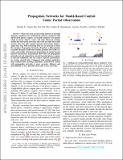| dc.contributor.author | Li, Yunzhu | |
| dc.contributor.author | Wu, Jiajun | |
| dc.contributor.author | Zhu, Junyan | |
| dc.contributor.author | Tenenbaum, Joshua B | |
| dc.contributor.author | Torralba, Antonio | |
| dc.contributor.author | Tedrake, Russell L | |
| dc.date.accessioned | 2020-08-14T13:23:08Z | |
| dc.date.available | 2020-08-14T13:23:08Z | |
| dc.date.issued | 2019-05 | |
| dc.identifier.uri | https://hdl.handle.net/1721.1/126583 | |
| dc.description.abstract | There has been an increasing interest in learning dynamics simulators for model-based control. Compared with off-the-shelf physics engines, a learnable simulator can quickly adapt to unseen objects, scenes, and tasks. However, existing models like interaction networks only work for fully observable systems; they also only consider pairwise interactions within a single time step, both restricting their use in practical systems. We introduce Propagation Networks (PropNet), a differentiable, learnable dynamics model that handles partially observable scenarios and enables instantaneous propagation of signals beyond pairwise interactions. With these innovations, our propagation networks not only outperform current learnable physics engines in forward simulation, but also achieves superior performance on various control tasks. Compared with existing deep reinforcement learning algorithms, model-based control with propagation networks is more accurate, efficient, and generalizable to novel, partially observable scenes and tasks. | en_US |
| dc.description.sponsorship | Charles Stark Draper Laboratory. Sponsor Award (SC001-0000001002) | en_US |
| dc.description.sponsorship | United States. National Aeronautics and Space Administration Sponsor Award (NNX16AC49A) | en_US |
| dc.description.sponsorship | National Science Foundation (U.S.) (Grant 1524817) | en_US |
| dc.description.sponsorship | United States. Defense Advanced Research Projects Agency. Explainable Artificial Intelligence (Grant FA8750-18-C000) | en_US |
| dc.description.sponsorship | United States. Office of Naval Research. Multidisciplinary University Research Initiative (Grant N00014-16-1-2007) | en_US |
| dc.language.iso | en | |
| dc.publisher | IEEE | en_US |
| dc.relation.isversionof | 10.1109/ICRA.2019.8793509 | en_US |
| dc.rights | Creative Commons Attribution-Noncommercial-Share Alike | en_US |
| dc.rights.uri | http://creativecommons.org/licenses/by-nc-sa/4.0/ | en_US |
| dc.source | arXiv | en_US |
| dc.title | Propagation networks for model-based control under partial observation | en_US |
| dc.type | Article | en_US |
| dc.identifier.citation | Li, Yunzhu et al. “Propagation networks for model-based control under partial observation.” Paper presented at the 2019 International Conference on Robotics and Automation (ICRA), Montréal, Québec, May 20-24, 2019, IEEE © 2019 The Author(s) | en_US |
| dc.contributor.department | Massachusetts Institute of Technology. Computer Science and Artificial Intelligence Laboratory | en_US |
| dc.contributor.department | Massachusetts Institute of Technology. Department of Brain and Cognitive Sciences | en_US |
| dc.contributor.department | Massachusetts Institute of Technology. Department of Electrical Engineering and Computer Science | en_US |
| dc.relation.journal | 2019 International Conference on Robotics and Automation (ICRA) | en_US |
| dc.eprint.version | Original manuscript | en_US |
| dc.type.uri | http://purl.org/eprint/type/ConferencePaper | en_US |
| eprint.status | http://purl.org/eprint/status/NonPeerReviewed | en_US |
| dc.date.updated | 2019-10-09T12:04:27Z | |
| dspace.date.submission | 2019-10-09T12:04:31Z | |
| mit.journal.volume | 2019 | en_US |
| mit.metadata.status | Complete | |
